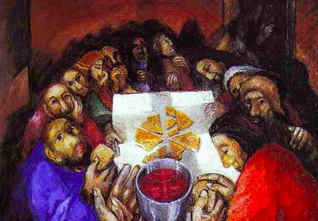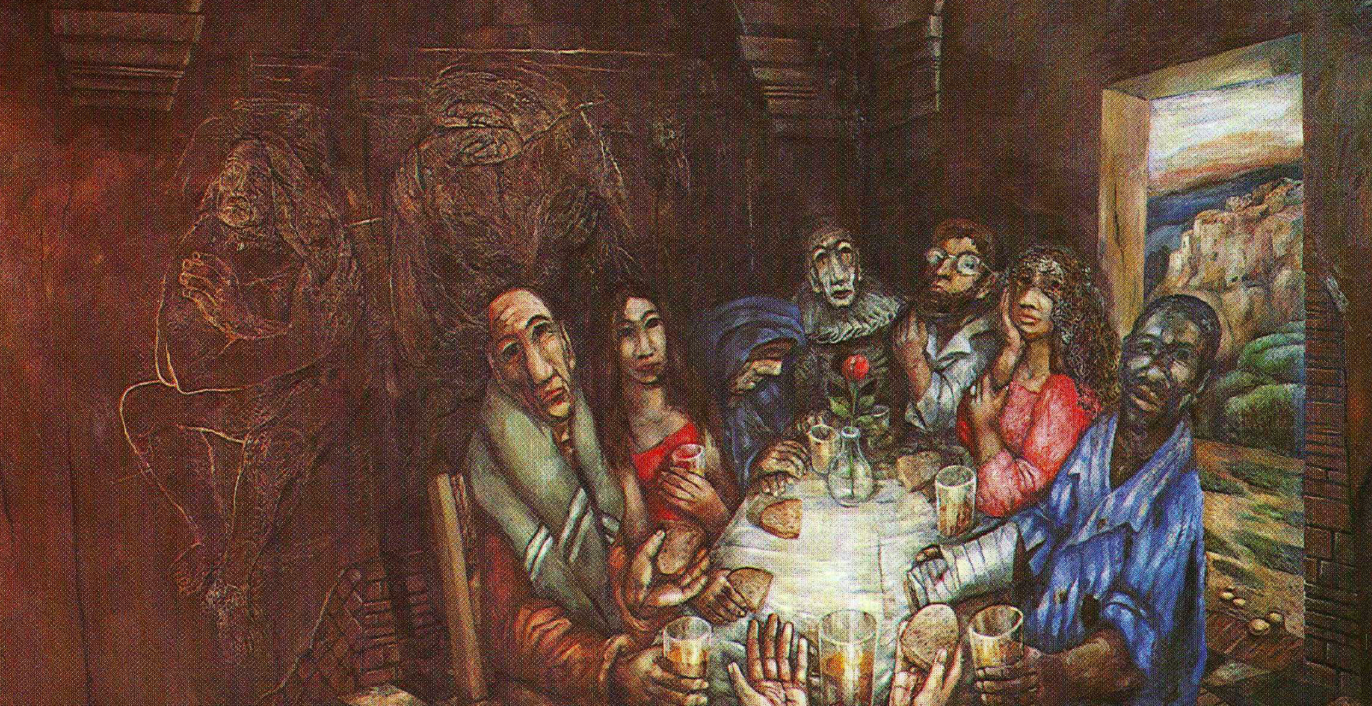This is a fair contextual, occasional, and exegetical (perhaps even original and certainly possible) reading of the Philippians 4:6-7. First, I have taken mēden (“no one,” μηδὲν) as nominative (vocative, actually), that is, as the subject of the command, which is totally possible and perhaps even preferable, and not accusative (i.e., what to be anxious about, that is no-thing). Granted, virtually no Bible translation or commentator takes the word as nominative. But understand, this word is spelt the same in both the nominative and the accusative declension. Of course, I am still comfortable (exegetically) taking it as the content of what to be anxious about, that is be anxious about “no-thing” ( i.e., mēden, μηδὲν, as accusative meaning, “nothing”)—this is the way Paul is normally translated (lit, be anxious about nothing, or as the ESV has it, “Do not be anxious about anything”). Yet my rendering (which is completely possible) is fair and fits the gathered church occasion and context, that is a church gathered at an evening banquet-meal, time of worship, and instruction) in some believer's living room in Philippi. I read our letters from Paul a little differently now that I have better understanding what the worship setting and venue looked like at that time. Each of Paul's letters, most likely, would have been read at a local church’s worship-time, most likely on a Saturday evening (it would be almost 150 years before churches started meeting early Sunday mornings on a regular bases) in someone’s home (i.e., a house-church). We know the patterns, that is the setting—what it looked like. The early church would gather together for a full meal (i.e., a supper), worship, and instruction patterned after the banquet-meal-symposium that were common to groups, societies, cults, guilds, and paterfamilias (male head of households) throwing a banquet at his home throughout the Greco-Roman world. At these banquet-meal-symposia, where the host would celebrate and drink (lift and pour out) a cup of wine to Caesar and some god (small “g”), or at the honoring of some benefactor, the new church would gather locally to celebrate and drink (lift) a cup of wine to celebrate and remember the Lord Jesus Christ. Most certainly this explains the first command in the text: “Rejoice in the Lord always; again I will say, rejoice” (v. 4). The banquet-meal-symposium of a local gathered church would break bread at the beginning (marking the start of the worship and fellowship time) as Jesus did with his first disciples at the Last Supper. Then, they would share a meal together. At the end of this time, the host would raise a cup of wine to celebrate and remember the Lord Jesus Christ (which normally in a non church setting would have been toasted to caesar and/or a god or at least their house-hold god). Then, the host would he would welcome communal prayers of the guests and, then, there would be a lively time for apostolic instruction and teaching of the gospel (which was the symposium). If there was a letter from, say the Apostle Paul, it would have been most likely read (and discussed) at this time. So re-imagine Philippians 4:4-7 being read out loud (obviously with the rest of the letter) at the just celebrated Table of the Lord (i.e., the lifting of the cup). Now hear the nuances of this setting, fellowship, and instruction. “Rejoice in the Lord always; again I will say, rejoice. Let your spacious generosity and humbleness [my rendering of the word, "gentleness," or "reasonableness" in the text] be known by all (who are at the Table of the Lord in the midst of your gathering together for worship [which fits the reason of the Letter in the first place, to heal conceited division and bring about joyous unity]. The Lord is near [a perfect phrase to mark the lifting of the cup and remembering the Lord and His kingdom have come]. No one (at the table, celebrating the Lord’s Supper at worship) be anxious. But! In all things by prayer and supplication with thanksgiving, your requests, make them known to God; and, the peace of God, which surpasses all understanding, will guard your hearts and your minds in Christ Jesus.” The power of this reading can be felt. May it be so in your own gathering of the saints.
2 Comments
Most take what Jesus says here in a self-protecting and spiritualized manner as if Jesus said, “I have not come to call the [self] righteous but [all] sinners [that is, those who recognize they are sinners] to repentance.” But this is not what Jesus said nor meant at all. “Righteous” and “sinners” are titles, stock terms, totally recognizable to the audience at that party. “Righteous” are those who keep the law of Moses, who have recognized status and position in and among Israelites; more narrowly to temple leadership and Jewish leaders of the Pharisees and Sadducees. “Sinners,” on the other hand, are the uneducated in the law of Moses, shepherds, outcasts, the disfranchised, Jewish tax-collectors for Rome, the working class, the poor, beggars, and slaves. This is made clearer by the Pharisees and Scribes pointing out, “Why do you eat and drink with tax collectors and sinners?” One cannot get around the social and cultural location embedded in this: The Jewish tax-collector for Rome, Levi puts on a banquet-meal for Jesus, who is to be the honored guest and symposium speaker for the evening. Jesus clearly states that he had come to call [probably the idea here, given the setting, "invited" to Jesus’ banquet-meal table], not the Jewish temple leadership, but social and religious outcasts. Jesus describes his banquet-meal and table as one of social leveling and transformation, along with the purposeful association of those considered outcasts and disenfranchised. We tend to generalize and uproot Jesus’ terms the “righteous” and “sinners,” so as to keep our categories of people comfortably and neatly in place. But in the end, Jesus still upsets our social categories, for this is the nature of the gospel of the kingdom. We need, in light of this text, to rethink "church" and "evangelism" and the importance use of meal and table as a venue for creating new social spheres and acceptance.
|
AuthorChip M. Anderson, advocate for biblical social action; pastor of an urban church plant in the Hill neighborhood of New Haven, CT; husband, father, author, former Greek & NT professor; and, 19 years involved with social action. Archives
February 2024
Categories
All
|
Pages |
More Pages |
|


 RSS Feed
RSS Feed